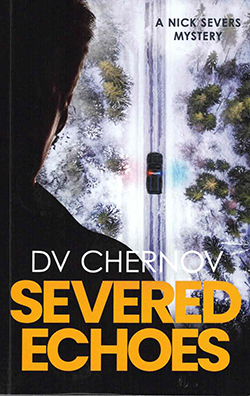Severed Echoes by DV Chernov; Heathen Press, LLC; © 2022; ISBN 9798986-329819; 328 pages; $16.99 on Amazon.

 SAN DIEGO — Author DV Chernov is a versatile Russian Jewish immigrant to the United States who following a career in high-tech wrote a spy novel set during the Russian Revolution. Now he has an engaging story about American detective Nick Severs who lives and works in a Colorado mountain town.
SAN DIEGO — Author DV Chernov is a versatile Russian Jewish immigrant to the United States who following a career in high-tech wrote a spy novel set during the Russian Revolution. Now he has an engaging story about American detective Nick Severs who lives and works in a Colorado mountain town.
One plot concerns a woman whose terrified voice on a 30-second recording leads Severs to investigate a high-tech communications company where she worked prior to her death. A subplot involves a female hacker who is stalking the detective because she thinks she may or may not have a score to settle with him.
As Chernov weaves these plots together, in asides he also provides commentaries on contemporary life. He extols a basic coffee maker, saying there was elegance in its simple purpose to do one thing well.
“This simplicity of function appealed to him. There was purity in it. Mastery. Which was more than one could say about most things these days. Some things – maybe. His pen, his notepad, his Springfield XD 9mm in its leather holster. They all came to work with Nick each day. Each was great at doing its one thing. But what about Nick? What was his one thing he was great at?”
In another aside, he ponders the “good news/ bad news” dichotomy. “Nick was a firm believer in starting with the good news. When someone started with the bad news, the good news that followed was never quite enough to offset the bad news, as in ‘Hey, the world is ending, but the good news is we found a cold six-pack of beer.’ Only an idiot would be excited about this. But if you flipped it around, everything changed.”
Yet another observation spices up the mystery: “When people hear the word human, most take it to mean something good. After all, being humane means being kind, tender and considerate. And being humanitarian means helping improve the wellbeing of others. But a language created by humans is like history written by the victors. We get to define ourselves, and naturally, we did so favorably, like a school child grading his own work. We imbued the word human with the quality of being elevated above the brutal, violent savagery of the animal world…”
A final example of Chernov’s delightful ramblings en route to surprise denouements for both the plot and subplot comes when Severs takes his wife Claire to see a Russian troupe’s performance of the ballet Swan Lake: “There was something too chaotic, too ambiguous, and noncommittal about ballet. Even now, as Prince Siegfried was leaping across the stage with a crossbow in his hand and something exaggeratedly large stuffed into the crotch of his white tights, Nick wondered how one choreographer’s Siegfried could do a cabriole and another choreographer’s Siegfried could do a pirouette at the exact same moment in the music. What did the difference signify? Would anyone in the audience notice if Siegfried decided to switch them around?”
These four aforementioned asides help define Severs’ character; he likes getting straight to the point, without the diversions his creator seems to favor.
All this leavens a quite readable detective mystery.
Furthermore, these examples may provide clues about author’ Chernov’s autobiography. He is Russian, so he might have been brought up watching Pyotr Ilyich Tchaikovsky’s Swan Lake in the months of January through November and his The Nutcracker in December.
Then Chernov moved to America, a country that is fascinated by gizmos with bells and whistles like automatic coffee makers. Chernov seems to prefer simple, functional things. Wrestling with the “good news, bad news” idiom, he confronts the typically American question “do you want the good news or the bad news first?” {Inc. reported that a 2013 study in Personality and Social Psychology Bulletin concluded that a majority of people prefer to hear the good news first.) Likewise, his mini-essay on the word “human” is an example of Chernov coming to grips with semantic prejudices in English.
*
Donald H. Harrison is publisher and editor of San Diego Jewish World.